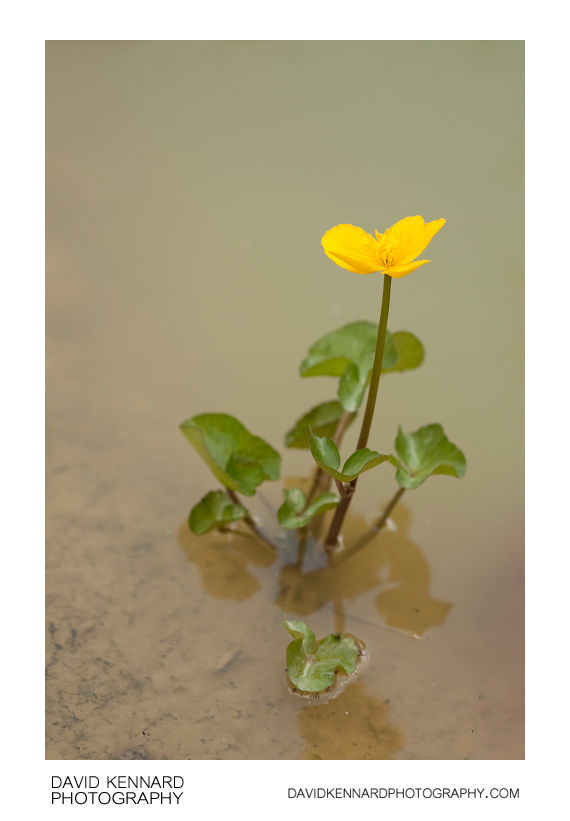Kingcup Caltha palustris

Description
- Title:
- Kingcup Caltha palustris
- Caption / Description:
-
Caltha palustris commonly known as Kingcup or Marsh Marigold belongs to the Ranunculaceae (buttercup family). It is native to temperate regions of the Northern Hemisphere (Europe including Iceland and Arctic Russia, temperate and Arctic Asia, and North America). It grows in wet, boggy places, such as marshes, fens, ditches and wet woods. It becomes most luxuriant in partial shade, but is rare on peat. In the UK, it is probably one of the most ancient British native plants, surviving the glaciations and flourishing after the last retreat of the ice, in a landscape inundated with glacial meltwaters.
The plant is a herbaceous perennial growing to 80cm tall. The leaves are rounded to kidney-shaped, 3-20cm across, with a bluntly serrated margin and a thick, waxy texture. Stems are hollow. The flowers are yellow, 2-5cm diameter, with 4-9 (mostly 5) petaloid sepals and many yellow stamens; they are borne in early spring to late summer. The flowers are visited by a great variety of insects for pollen and for the nectar secreted from small depressions, one on each side of each carpel. Carpels form into green sac-like follicles to 1 cm long, each opening to release several seeds. It flowers early April and May and is very valuable to insects at this time as they provide nectar and pollen to them.
Caltha palustris is a highly polymorphic species, showing continuous and independent variation in many features. Forms in the UK may be divided into two subspecies: Caltha palustris subsp. palustris, and Caltha palustris subsp. Minor.
It is sometimes considered a weed in clayey garden soils, where every piece of its root will survive and spread. In warm free-draining soils, it simply dies away.
As is the case with many members of the Ranunculaceae, all parts of the plant can be irritant or poisonous. Skin rashes and dermatitis have been reported from excessive handling of the plant.
In the UK, Caltha palustris is known by a variety of common names, varying by geographical region. These include Marsh Marigold and Kingcup (the two most frequently used common names), Mayflower, May Blobs, Mollyblobs, Pollyblobs, Horse Blob, Water Blobs, Water Bubbles, Gollins and the Publican. The common name of marigold refers to its use in churches in medieval times at Easter time as a tribute to the Virgin Mary, as in Mary gold. The specific name palustris, from Latin "of a marsh", indicates its common habitat.
Richard Mabey, in his magisterial Flora Britannica, describes Caltha palustris thus:
"Marsh-marigolds are in decline as agricultural land continues to be drained, but they are still the most three-dimensional of plants, their fleshy leaves and shiny petals impervious to wind and snow, and standing in sharp relief against the tousled brown of frostbitten grasses. Most of the plant's surviving local names - water-blobs, molly-blobs, water-bubbles - reflect this solidity, especially the splendid, rotund 'the publican' from Lancashire."In North America Caltha palustris is sometimes known as cowslip. However, cowslip more often refers to Primula veris, the original plant to go by that name. Both are herbaceous plants with yellow flowers, but Primula veris is much smaller.
Caltha palustris is a plant commonly mentioned in literature, including Shakespeare:
Winking Marybuds begin
To open their golden eyes (Cymbeline, ii. 3).
Kingcup Cottage by Racey Helps is a children's book which features the plant.
In Latvia Caltha palustris is also known as Gundega which is also used as a girls name which symbolizes fire. The word Gundega is made from 2 words - uguns (fire) and dega (burned). This refers to the burning reaction that some people experience from contact with Caltha sap.Description from Wikipedia: http://en.wikipedia.org/wiki/Caltha_palustris
- Tags / Keywords:
-
- Biota
- Life
- Vitae
- Eukaryota
- Plantae
- Plants
- Magnoliophyta
- Flowering Plants
- Angiosperms
- Magnoliopsida
- Dicotyledons
- Buttercups
- Ranunculales
- Ranunculaceae
- Caltha
- Marsh Marigolds
- Caltha palustris
- Kingcup
- Yellow Marsh Marigold
Admin
- Date Original Photo Taken:
- Original File Name:
- _MG_8643.CR2
- Event:
- Rating:
- ☆
- Date this image added/last updated on website:
- Original File Dimensions:
- 2848px x 4272px
- File Type:
- JPEG
- Color Mode:
- RGB
- Original Image Color Profile:
- Adobe RGB (1998)
Location
- Location Created:
-
- Sublocation:
- City:
- Market Harborough
- Province/State:
- Leicestershire
- Country:
- United Kingdom
- World Region:
- Europe
- Geo-location:
Rights
- Copyright Status:
- Copyrighted
- Licensing Status:
- Rights Managed
- Available for Editorial Use:
- Yes
- Available for Commercial Use:
- Yes
- Copyright Notice:
- © 2010 Dave Kennard
Camera Data
- Date Digital Resource was created:
- Shutter speed:
- 1⁄200 s
- Aperture:
- f/2.8
- Camera Model:
- Canon EOS 450D
- ISO:
- 100
- Exposure Compensation:
- 0
- Focal Length:
- 100mm
- Focal Length (35mm equiv.):
- Metering Mode:
- Multi-segment
- Flash:
- Off, Did not fire
- Exposure Mode:
- Manual
- White Balance:
- Manual
- Light Source:
- Exposure Program:
- Manual
Additional shooting metadata
- Lens:
- Canon EF 100mm F2.8 Macro USM
- Filters used:
- Additional Optics used:
- Setup:
- Handheld
Canon MT-24EX Macro Twin flash with home-made diffusers
Post Processing
- Image Modified:
- Software used:
-
- Adobe Camera RAW
- Post Processing:
-0.25 exposure compensation in ACR
7 recovery in ACR
